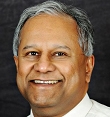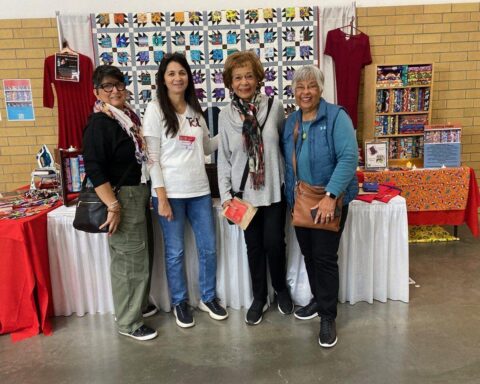The timing couldn’t have been more perfect to project the commonalities between Canada and India.
“Two great democracies, India and Canada, both champions of human rights and human dignity,” said Jason Kenney, Canada’s Minister of Employment and Social Development and Minister for Multiculturalism, heralding the yet-to-be-made-official decision by Prime Minister Manmohan Singh of India not to attend the Commonwealth Heads of Government Meeting (CHOGM) in Colombo.
Prime Minister Stephen Harper is the only other leader boycotting the summit over human rights violations by the Sri Lankan state. India has not made the move public as diplomatic etiquette dictates that the host country be informed of the decision first.
Both Mr. Harper and Mr. Kenny were at the 13th national celebration of Diwali on Saturday, held for the first time outside of capital Ottawa. They said the Indian festival is now a “Canadian celebration for all Canadians.” Chris Alexander, Minister of Citizenship and Immigration, resplendent in an Indian outfit, introduced his colleagues to the large audience.
The change in venue was for a good reason as the Greater Toronto Area (GTA) has become a key testing ground for the federal Conservatives. Most members of the party’s caucus from the area were on hand at the well-attended celebration.
‘Putting India at the centre’
Mr Harper, who was attending the celebration for the seventh time as prime minister, said it was the biggest and the best one yet. Affirming that his “government is putting India at the centre of Canada’s Asia policy,” Mr Harper said his second trip to India exactly a year ago, which lasted 12 days, was his longest to any country as prime minister. Diwali is by far the most popular festival in India.
“Canada has a larger and more important presence in India now than in virtually any other developed country. And that is because we believe in India as the world’s largest democracy, we believe in India as a reference point for our pluralism,” said Mr. Kenney. “We Canadians did not invent diversity. India was remarkably diverse even before we thought of the idea in this country.”
Mr. Kenney said Canada has developed its closest-ever relationship with India under Mr. Harper’s leadership. It took “courage and tenacity” to bolster the relationship after being in the “deep-freeze for 35 years for lot of different reasons.”
That closeness was in evidence recently when Salman Khurshid, India’s foreign minister, was in Canada recently for the first-ever strategic dialogue with Foreign Affairs Minister John Baird. While Mr. Khurshid is likely to represent India at the CHOGM, Deepak Obhrai, the parliamentary secretary to Mr. Baird and one of the main the organizers of the Diwali event, will be going to Colombo on Canada’s behalf.
‘Cusp of deepening ties’
Akhilesh Mishra, India’s Consul General in Toronto, said recently at a Indo-Canadian forum that relations between the two countries were on the “cusp of a significant upgrading and deepening.” He said the “candour and warmth” during the meeting between M. Khurshid and Mr. Baird was exceptional.
“In a challenging neighbourhood with an abundance of opportunity, the importance of the Canada-India relationship is underscored in this first official visit of my counterpart in 15 years,” Mr. Baird had said after his talks with Mr. Khurshid. “The frequent and diverse range of economic, security and global issues that Canada and India are now interacting on represents only the beginnings of the great potential of our bilateral relations.”
Trade-wise, that potential is yet to be exploited as the current level is a modest $5.2 billion. Investment wise, India has a much larger stake in Canada at $14.3 billion as against Canada’s $4.3 billion in India. India already imports 40 per cent of its pulses and 25 per cent of its potash from Canada.
Canada and India have been haggling over the details of a foreign investment protection agreement since 2004: the main purpose being to get New Delhi grant Canadian investments in India the same protection Indian investments enjoy in Canada. Ottawa recently signed a similar deal with Beijing that had been 18 years in the making.
The bigger prize in the Indo-Canadian sphere is a bilateral free-trade agreement, which the two have been discussing since 2010, that would see annual trade triple to $15 billion by 2015.
Nuclear ‘freeze’ over
The earlier freezing of Indo-Canadian relationship that Kenny talked of at the Diwali event was triggered after India tested nuclear devices – first in 1974 and then again in 1998.
Having overcome those differences, Canada and India have now taken the next step towards full implementation of a nuclear co-operation agreement. The Canadian Nuclear Safety Commission and India’s Department of Atomic Energy finalized an arrangement this April that would allow Canadian companies to export nuclear items to India for peaceful uses.
India has announced plans to build 12 new reactors by 2021, so the country’s demand for uranium is expected to triple to about $650 million in annual purchases. Canada is the world’s second-leading producer of uranium, behind Kazakhstan.
“Yes prime minister, I am counting and would continue counting,” quipped Mr Obhrai about the future Diwali events he foresaw Mr. Harper attending. – New Canadian Media
Ranjit is a Toronto-based writer with interest in Canadian civic affairs, immigration, the environment and motoring. Maytree and Al Jazzera English alumnus.





